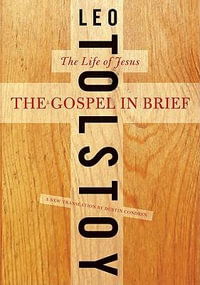Magnificent new translation of Tolstoy’ fiction by the acclaimed duo behind War and Peace
The Death of Ivan Ilyich is one of the masterpieces of Tolstoy’s late fiction and the first major fictional work to be published by the author after his crisis and conversion to Christianity. The story of the life and death at the age of forty-five, of a high court prosecutor in 19th-century Russia, it is an intense and moving examination of loss and the possibilities of redemption, in which Tolstoy explores the dichotomy between the artificial and the authentic life.The nine other stories in this new collection include ‘Hadji Murat’ which has been described by Harold Bloom as ‘the best story in the world’ and ‘The Devil’, a tale of sexual obsession based on Tolstoy’s own relationship with a married peasant woman on his estate in the years before his marriage.
Magnificently translated by the acclaimed translating team behind War and Peace, this new volume captures the richness and immediacy of Tolstoy’s language and reveals the author as a passionate moral guide, an unflinching seeker of truth, and a creator of enduring and universal art.
About the Author
Count Leo Nikolaevich Tolstoy displayed an extraordinary duality of character in a life filled with deep contradictions. He was born to an artistocratic Russian family on Sept. 9, 1828. His parents died when he was young, and he was raised by several female relatives. In 1844 he entered the University of Kazan, remaining there only three years. At the age of 23, Tolstoy joined the Russian Army and fought in the Crimean War. While still in the service, his first published story appeared, a largely autobiographical work called CHILDHOOD (1852). Tolstoy returned to his estate in 1861 and and established a school for peasant children there. In 1862, he married Sofia Behrs and gradually abandoned his involvement with the school. The next fifteen years he devoted to managing the estate, raising his and Sofia's large family, and writing his two major works, WAR AND PEACE (1865-67) and ANNA KARENINA (1875-77). During the latter part of this fifteen-year period, Tolstoy found himself growing increasingly disenchanted with the teachings of the Russian Orthodox Church. In the ensuing years, Tolstoy formulated for himself a new Christian ideal, the central creed of which involved nonresistance to evil; he also preached against the corrupt evil of the Russian state, of the need for ending all violence, and of the moral perfectibility of man. He continued to write voluminously, primarily nonfiction, but also other works, such as THE DEATH OF IVAN ILYICH (1886). In 1910, still unable to reconcile the differences in the lives led by the aristocracy and the simpler existence he craved, Tolstoy left the estate. He soon fell ill and was found dead on a cot in a remote railway station. He was buried on his estate at Yasnaya Pulyana.
Industry Reviews
As good as anything Tolstoy ever wrote... Self-assured, vital, unforgettable * Guardian *
The simplicity and power of this novella, the story of the terrible encroachment of death on a shallow man spiritually unprepared for it, has staggered millions * Sunday Telegraph *
I don't read Russian, but I think Tolstoy's writing comes over whatever translation you read...he wrote the great, terrible story The Death of Ivan Illyich -- Redmond O'Hanlon * Independent *
An indubitable masterpiece -- Yann Martel
For me, the best insight into the process of dying comes from Leo Tolstoy in his short story, The Death of Ivan Ilych, which examines the life and death of the most ordinary man -- Oliver James * Mail on Sunday *
























